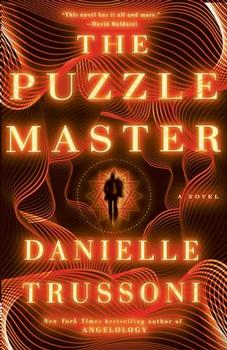Summary | Excerpt | Reviews | Beyond the Book | Read-Alikes | Genres & Themes | Author Bio

A Novel
by Danielle TrussoniThis article relates to The Puzzle Master
 In Danielle Trussoni's The Puzzle Master, protagonist Mike Brink was once on his way to a promising football career until an injury fundamentally changed the way his brain worked, leading him away from the gridiron and into MIT. As Trussoni mentions in a brief author's note, Brink's diagnosis—acquired savant syndrome—is a real, albeit rare, phenomenon.
In Danielle Trussoni's The Puzzle Master, protagonist Mike Brink was once on his way to a promising football career until an injury fundamentally changed the way his brain worked, leading him away from the gridiron and into MIT. As Trussoni mentions in a brief author's note, Brink's diagnosis—acquired savant syndrome—is a real, albeit rare, phenomenon.
According to the Brain Injury Law Center, the condition, which has also been described as "prodigious savant" or "accidental genius," involves "the presentation of (often extraordinary) scholarly skills that can emerge after a non-disabled individual suffers a traumatic brain injury or illness." This is believed to result from the brain's right hemisphere over-compensating after a traumatic injury to the left, often the left anterior lobe.
The astonishing skills that are revealed usually fall into five general categories: music, calendar calculating (calculations involving calendar dates), mathematics, visual art, and spatial/mechanical aptitudes, though some affected individuals have exhibited a prodigious ability in learning languages or experienced synesthesia (for example, seeing sounds as colors).
The number of people with acquired savant syndrome is vanishingly small—fewer than 50 documented cases exist. But their stories are fascinating. One example is the case of Orlando Serrell, who, after recovering from being hit in the head with a baseball at the age of 10, exhibited the ability to perform calendrical calculations with remarkable speed and accuracy. After a fall into a swimming pool, Derek Amato experienced a severe concussion; despite having little musical aptitude before his injury, he was subsequently able to play the piano and create intricate compositions.
Brain imaging studies seem to suggest that traumas don't create "accidental genius," they just unlock potential that was already present, perhaps by releasing the right brain's creativity that was previously inhibited by the more logical prefrontal cortex. For some researchers, such as Allan Snyder, a neuroscientist and director of the Centre for the Mind at the University of Sydney, this raises questions about what gifts and abilities might be latent in all of our brains and about how to unlock them, perhaps through electrical stimulation or pharmacological options. Others, however, are more skeptical, pointing out that, among other concerns, these extraordinary abilities often go hand-in-hand with less desirable repercussions of traumatic brain injury such as chronic pain and neurological side effects (as is the case with the fictional Mike Brink). Regardless, these captivating case studies offer plenty of fuel for the imagination, and for speculation about the hidden potential of the human brain.
Photo of pianist playing piano with sheet music by Anastasia Kolchina, via Pexels
Filed under Medicine, Science and Tech
![]() This "beyond the book article" relates to The Puzzle Master. It originally ran in July 2023 and has been updated for the
March 2024 paperback edition.
Go to magazine.
This "beyond the book article" relates to The Puzzle Master. It originally ran in July 2023 and has been updated for the
March 2024 paperback edition.
Go to magazine.
Your guide toexceptional books
BookBrowse seeks out and recommends the best in contemporary fiction and nonfiction—books that not only engage and entertain but also deepen our understanding of ourselves and the world around us.